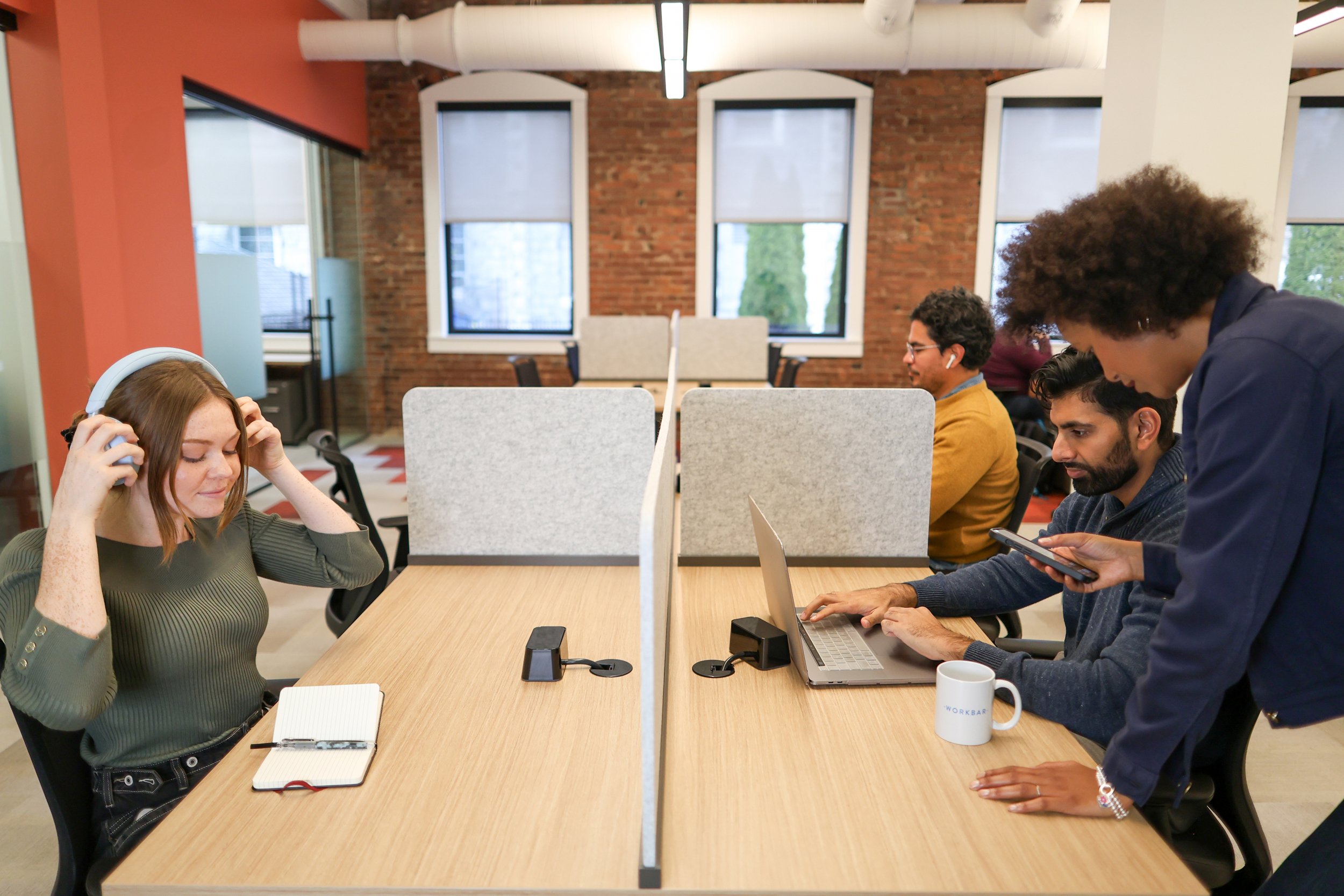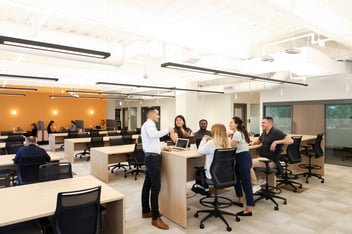How to Find the Right Coworking Space in Boston

Thinking about coworking in Boston but not sure where to start? This guide breaks down what coworking really is, clears up common misconceptions, and helps you choose the right space for you or your team.
What is Coworking?
By definition, coworking is an arrangement where individuals from different companies share the same office space. The origin of the word is community + working. It’s often lumped in with terms like shared office space or flex space. Some coworking operators approach it like a real estate business, others like a hospitality experience.
Coworking is more than desks, wifi and coffee. When Workbar was founded in 2009, it was built on the belief that innovation is more likely to happen in a space where people from different backgrounds, whether its companies, job function, etc., bump and connect with each other. Our spaces have been intentionally designed for that kind of interaction since day one. As one Workbar member points out, “The real value of Workbar lies in the intellectual capacity and the fidelity of the people around you.”
Today, it’s also the answer to the biggest challenge businesses face, uncertainty.
Why Coworking Exists
Before the 1980s, getting office space meant signing a long-term lease, investing in a costly buildout, and committing to stay put for five to ten years. That made sense when companies grew in predictable, linear ways.
Today? Not so much.
Startups scale overnight. Teams grow and contract based on funding rounds, product pivots, or market conditions. Even established enterprises are shifting to hybrid models that no longer justify the traditional office setup for a growing majority of businesses.
Enter coworking. It offers flexibility, cost savings, and convenience, without the long-term risk.
Common Coworking Misconceptions
Because the coworking industry is still evolving, there’s still confusion around what it is and who benefits from it. Let’s clear up a few of those common misconceptions.
It’s just for startups and freelancers.
Coworking might have begun as a haven for solo entrepreneurs and small teams, but it’s now a strategic solution for companies of all sizes.
It’s noisy.
That depends on the space. At Workbar, our activity-based layout separates quiet zones from collaborative areas. No side-eye necessary. We built an entire neighborhood just for phone calls.
It’s not professional enough for “real” business.
It sure beats Starbucks. But in all seriousness, in today’s world, even VCs and investors are pointing their portfolio companies toward coworking. Why? Because smart businesses aren’t sinking time or money into real estate that doesn’t work.
You’ll be working next to strangers who will steal your IP.
This is giving Arthur Slugworth vibes. Yes, you’re sharing space, but great coworking environments foster community and inclusion. You’re more likely to make a connection that helps your business than one that hurts it.
It’s expensive.
Coworking eliminates upfront buildout costs, long-term leases, and the burden of managing office infrastructure. It’s cost-effective, especially for hybrid teams that don’t need dedicated space 24/7. Most companies will tell you it saves money and increases team productivity.
It’s either a chaotic open floor plan or a soulless maze of offices.
Not true. The best coworking spaces strike a balance. At Workbar, we combine thoughtfully designed open coworking areas and dedicated private offices. You don’t have to choose between community and productivity. You can have both.
WeWork = Coworking? Not Quite.
Just like Kleenex became shorthand for tissues, “WeWork” is often used as the catch-all term for coworking. While WeWork definitely helped put coworking on the map, it’s just one player in a much bigger industry.
Coworking today includes a wide range of operators—from massive national brands like IWG (Regus and Spaces), Industrious, and yes, WeWork, to regionally-rooted independent coworking spaces in Boston like Workbar and CIC.
The difference? Big operators often offer consistency and scale, but indie spaces tend to bring more flexibility, local expertise, and thoughtful design. So when someone says “WeWork,” what they really mean is coworking. And coworking is so much more than just one name.
How to Choose the Right Coworking Space for You (or Your Team)
Not all coworking spaces are created equal, and that’s a good thing. Whether you're flying solo, building a startup, or leading a growing team, the right space should support how you work.
At Workbar, that could mean a private office, a dedicated desk, or a flexible coworking membership that lets you drop in a few times a month. Our memberships are designed to be customizable—so whether you're looking for structure, flexibility, or a mix of both, there's an option that fits your unique workflow.
Start by thinking through a few key factors:
Location & Convenience
How close is it to where you (or your team) live or commute? Does it make your day easier?
Price & What’s Included
What’s the monthly cost—and what’s actually included? Is it all-inclusive, or are there extra fees for the basics?
Vibe & Fit
Do you feel like you belong there? Is it a space that energizes you or your team? Can you picture yourself showing up and actually wanting to work?
If you're looking for a workspace that adapts to how people actually work, Workbar stands out in a few key ways:
Physical Layout: Workbar is the only coworking provider with a physical layout designed to support all work styles and preferred levels of engagement. Our coworking neighborhoods are what set us apart. Each neighborhood is a distinct area within our space, designed with specific work styles in mind, and comes with clearly posted Community Norms to help regulate behavior. This element of our design is the only of its kind in the coworking industry, and was featured in an article our CEO published for Forbes.
Regional Density: Workbar’s regional density model is designed to bring workspaces closer to where people live, work, and play. With 11 coworking locations strategically spread across Greater Boston—including Arlington, Back Bay, Burlington, Cambridge, Downtown, Framingham, Needham, Quincy, Salem, Woburn, and Worcester—members are never far from a productive and inspiring workspace.
Community Manager: Our Community Managers do more than keep things running, they’re the heartbeat of every Workbar. They manage both the people and the space, making sure everything feels intentional, not incidental. If a task belongs in the back office, that’s where it stays, so our Community Manager can focus on what matters, the people in the space. Our Community Managers set the tone of the space, uphold our Community Norms, and create the kind of environment where people actually want to show up and get to work.
Found a Coworking Space You Like? Here’s How to Make Sure It’s the One
Book a tour.
There is no substitute for touring the space, meeting the Community Manager, and getting a feel for the vibe.
Try before you buy.
At Workbar, we offer a free trial day so you can see how it fits your work style, no strings attached.
Think beyond one location.
If you're in and out of meetings across the city (or the suburbs), pick a provider like Workbar with a regional network. One membership, multiple places to be productive.
Talk to other members.
The real magic of coworking happens between the desks, conversations, introductions, collaborations. Ask around.
Be clear on what you need.
How often are you going to come in? What type of environment are you most productive in? People aren’t one size fits all and their workspace shouldn’t be either. Our sales process is thoughtful, not transactional. We want to match you with the right membership, whether it's just for you or for your whole team.
Ready to get started? We saved you a seat.


